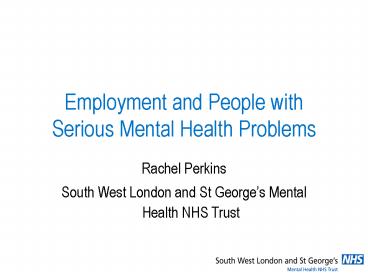Employment and People with Serious Mental Health Problems - PowerPoint PPT Presentation
1 / 13
Title:
Employment and People with Serious Mental Health Problems
Description:
Competitive employment real jobs ... Caretaker. Hairdresser. Sales Assistant x8. IT Support desk. Administrator. Decorator. Cleaner ... – PowerPoint PPT presentation
Number of Views:33
Avg rating:3.0/5.0
Title: Employment and People with Serious Mental Health Problems
1
Employment and People with Serious Mental Health
Problems
Rachel Perkins South West London and St Georges
Mental Health NHS Trust
2
- Most people with serious mental health problems
- are currently unemployed
- want to work
- can work if they are provided with the right kind
of support - ... and clinical treatment is not enough
3
What is the right kind of support?Individual
Placement with Support (IPS) evidence based
supported employment
- Competitive employment real jobs
- sheltered work, work training in segregated
settings do not work - Rapid job search place-train rather than
train-place - Integration of employment support and clinical
treatment - employment specialists in clinical teams
- Eligibility based on client choice
- if a person wants a job help them to get one
dont select on the basis of diagnosis,
severity, employability work readiness
.,.. - On-going supports
- fluctuating conditions require ongoing support
often episodic - Job matching based on client preferences
- Benefits counselling
- (Becker IPS Fidelity Scale, 2008) (Bond, 2004)
4
Competitive employment rates in 16 randomised
controlled trials of supported employment ... all
getting the same treatment but different kinds of
employment support
5
- European randomised controlled trial compared
traditional vocational service (non-integrated
train-place) with IPS for people with
schizophrenia ... all being treated by the same
clinical teams (Burns et al, 2007) - 55 gained employment in IPS vs. 28 in
traditional train-place service - 13 drop-out in IPS vs. 45 in traditional
service - 20 readmitted in IPS vs. 31 in traditional
service - Four studies with 10-year follow-ups show that
work outcomes improve over time (Test, 1989
Salyers 2004 Becker, 2006 Bush, 2008) - Employment associated with improved self-esteem,
symptom control, quality of life ... no changes
with sustained sheltered employment (Bond, 2001)
6
And its not just research trials it also works
in regular day to day practice ...
- Employment Specialists in 11 out of 18 South West
London Community Mental Health Teams (2007/8)
in just one year - 1984 people received vocational support
- 1155 people successful in working/studying in
mainstream integrated settings - 645 people supported to get/keep open employment
- 293 people supported to get/keep mainstream
education/training - 217 people supported in mainstream voluntary work
- And they are not just stacking shelves
7
Wholesale manager Accountant IT Assistant
Mental health development worker Ward
assistant Bookmaker retail Call centre
handler Retail assistant Receptionist Baker H
airdresser MH advocate Occupational Therapy
Assistant Accountants officer
Catering assistant Chambermaid Cleaner Hotel
Porter Labourer Leaflet dropper Plumbers
assistant Post assistant Recycling
assistant English Teacher Actor Journalist Admin
worker Credit controller Project worker
(private sector)
IT Helpdesk Admin Assistant Civil servant -
executive officer Baker Carpenter Caretaker Ha
irdresser Sales Assistant x8 IT Support
desk Administrator Decorator Cleaner Street
cleaner Warehouse worker Market research
administrator Baker Care assistant
Civil Servant (administrator) Production
assistant Assistant special needs
teacher Administrative Assistant
x5 Regeneration project worker Glazier Plumb
er Catering manager IT trainer Nurse Health
records officer
Hairdresser assistant Indian Restaurant
waiter Leisure assistant Driver Bar
work Barista Sales Advisor Boatyard worker Café
Assistant Catering assistant Teaching
assistant Social worker Youth Worker Financial
controller
8
Many people with serious mental health problems
are in employment/education when they are first
diagnosed ... so helping people to retain
employment/education is important (maybe in a
different job)
9
The typical picture ...
- In comparison with people with other health
conditions, people with mental health problems
are twice as likely to lose their jobs following
the onset of problems (Burchardt, 2003) - Rapidly decreasing employment rates following
onset of serious mental health problems. - one study found that 52 of people were in
employment at first hospital admission but only
25 at 2 month follow-up - another found only 13 in employment 12 months
after first admission - people with a diagnosis of schizophrenia using
services for at least 2 years 4 in employment - But it doesnt have to be this way
10
Early Intervention for First Episode
Schizophrenia (mean age 21 years)including
Individual Placement with SupportAfter the two
years 73 in employment or mainstream
education/training
11
Raising expectations ... of health workers and
people with mental health problems If you provide
employment support fewer people write themselves
off as unable to work because of their mental
health problems
12
(No Transcript)
13
- Provide specific employment support as well as
treatment - Integrate employment support and health treatment
- Intervene very early provide employment support
from the start - Help people to maintain employment/education they
already have before they become ill (including
helping them to find a new job if necessary) - Focus on real work open employment
- Dont select people on the basis of their
diagnosis - Provide ongoing support and accommodate
fluctuating conditions ... perhaps Access to Work
could be used to pay for this?

